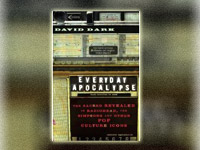Everyday Apocalypse: The Sacred Revealed in Radiohead, the Simpsons and Other Pop Icons (David Dark, 2002)

David Dark teaches English in Nashville, Tennessee, and so is in a good position to tell us we don’t know the correct meaning of “apocalypse.” We think it means something about the future, predictions of how everything will end, and so is a story filled with fire and judgment and chaos. Not so, he replies. It’s about “revealing,” or an “epiphany” whereby the deeper meaning of things is suddenly made clear to us. It’s when we have eyes to see past the mere surface of things to a deeper significance which comes from the fact that things are related to God’s purposes in creation and redemption. “As a literary genre,” N. T. Wright says in The New Testament and the People of God , “ ‘apocalyptic’ is a way of investing space-time events with their theological significance; it is actually a way of affirming, not denying, the vital significance of the present continuing space-time order, by denying that evil has the last word in it.”
In Everyday Apocalypse Dark first corrects our understanding of the term, and then helps us, chapter by chapter, to look with opened eyes at selected parts of popular culture. It is obvious he has his finger on the pulse of our postmodern world, because his selections reveal an ability to ignore the spin of the marketplace and get to things that matter. He takes us to the fiction of Flannery O’Connor, the cartoon satire of The Simpsons, the music of Radiohead and Beck, films like The Matrix and The Truman Show , and the cinematic vision of Joel and Ethan Coen. In each case he helps us see why these artifacts of popular culture resonate so powerfully in the hearts, minds, and imaginations of the postmodern generation. And in the process Dark teaches us to see.
Since our doing is always linked inextricably to the way we see things, Dark also warns that refusing to see doesn’t just decrease our appreciation for things, but deforms our ability to be faithful. “When we refuse to look apocalyptically, our lives become bored, depressed, and mean,” he writes. “We also find it difficult to think or imagine beyond ourselves or whatever we term the ‘interests’ of our own family, friends, and culture. Going to the trouble of wondering what it might be like to exist outside of the class or country within which we happen to have been born becomes a task we wouldn’t dream of undertaking even as we resent the suggestion that we should. This is what my colleague, Thomas Hayes, calls a ‘selective fundamentalism.’ We choose our die-hard stands to suit our lifestyles and our prejudices. Our absolute truths and values, our nonnegotiables, conveniently coincide with whatever lives we’re already living and whatever decisions we’ve already made. The apocalyptic mind will resist surrendering to this tendency while noting that it’s an imprisonment to which we are born. Being disabused of this surrounding insanity is a big part of what ‘being saved’ will mean.”
Everyday Apocalypse is not always easy reading, but it is always worth reading. We recommend it to you, both for learning how to have eyes that see, and for the chance to listen in as David Dark looks at our world.

